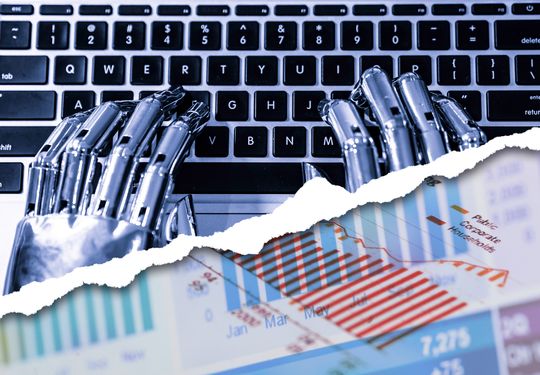JPMorgan Chase & Co., the largest U.S. bank, has been wading into artificial intelligence to a greater extent than its rivals and is now producing a series of research notes that are AI-generated.
The move represents something of a step forward in an area that’s been seen as ripe for disruption — investment research — at a time when the AI revolution is taking hold on Wall Street. At JPMorgan, AI is being used to create short summaries of human-produced reports and to link those reports inside the firm’s Cross Asset Spotlight.
Questions remain over how far machine-generated research can go in replacing humans, and regulations on it are still in the early stages — putting pressure on Wall Street banks to be completely transparent about how their research is being put together. Research reports are generally subject to rules from Finra, or the Financial Industry Regulatory Authority, which require that a qualified registered principal approves a report prior to distribution to the public. Banks may also include legal or compliance approvals as part of their process. Through a spokeswoman, JPMorgan JPM, -0.77% declined to comment for this article.
In a disclaimer attached to JPMorgan’s Cross Asset Spotlight note, primary authors Thomas Salopek and Federico Manicardi cited the large amount of content that investors need to sift through in constantly-moving markets as part of the reason that AI is being used. Salopek and Manicardi said they can produce an AI-generated summary of the most relevant and recent analyst reports on a particular topic or event — as they did on Tuesday with a focus on earnings, China, the soft-landing scenario, and AI’s impact on U.S. interest rates.
“What seems to be going on here is that they’re using an AI-based system to build a summary publication of existing human-generated reports that are already out there,” said Michael Wagner, co-founder and chief operating officer of Omnia Family Wealth, a multifamily office based in Miami, which oversees more than $2.5 billion and is already using AI to assist with its client conversations.
“It certainly is still relatively unusual, but I think analyst jobs are safe for now,” Wagner said in an email to MarketWatch. “It’s an interesting development that shows how AI-driven automation could impact labor markets. If relatively repetitive ‘knowledge work’ can be automated in this fashion, banks and law firms may not need as many lower-level employees as they do today.”
New York-based JPMorgan has been leading Wall Street’s shift toward AI in a number of different ways. From February through April, the bank advertised more than 3,600 jobs globally that are all related to AI, according to Bloomberg. In May, it filed a patent application for its own software, known as IndexGPT, which can be used for analyzing and selecting securities for its clients. And JPMorgan has also created a tool that scans speeches by Federal Reserve officials to detect policy shifts and potential trading signals.
Rivals of JPMorgan haven’t gone quite as far. Representatives of BofA Securities BAC, +0.92%, Citi C, -0.76%, and Deutsche Bank DB, +0.35% said their organizations haven’t produced any AI-generated research notes.
Goldman Sachs GS, +0.31% has written about the economic and market impacts of AI, but hasn’t used the technology to write text for its research yet, according to economist Joseph Briggs and chief global strategist Praveen Korapaty. Morgan Stanley MS, +0.22% declined to comment through a spokeswoman.
On Friday, Dow industrials DJIA, +0.01% and the S&P 500 SPX, +0.03% closed almost unchanged as investors prepared for a major rebalancing of the Nasdaq-100 index. Meanwhile, Treasury yields finished mixed ahead of next week’s policy announcement by the Fed.

